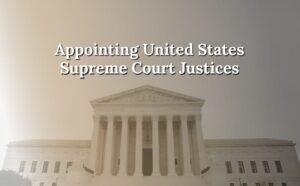Which Supreme Court Justices Voted Against Roe v. Wade
The landmark 1973 Supreme Court case Roe v. Wade established the right to abortion access across the United States. However, in June 2022, the Court overturned this precedent in the case Dobbs v. Jackson Women’s Health Organization. Five conservative justices formed the majority opinion striking down Roe. This monumental ruling stunned many Americans and ignited intense debates around reproductive rights.
Background on Roe v. Wade
Context of the Case
In 1970, a pregnant woman named Norma McCorvey (under the pseudonym Jane Roe) sued Dallas County District Attorney Henry Wade, challenging a Texas law that banned abortion except to save a woman’s life. At the time, most states had similar abortion restrictions. Roe’s lawyers argued the bans violated her constitutional right to privacy.
Original 1973 Supreme Court Ruling
In a 7-2 vote, the Supreme Court ruled in Roe’s favor in 1973. They deemed that the Due Process Clause of the 14th Amendment protected a fundamental right to privacy that encompassed abortion access. This prevented states from banning the procedure before fetal viability, usually around 23-24 weeks. The decision nullified the Texas law and those of many other states.
The Dobbs v. Jackson Ruling in 2022
How the Case Reached the Supreme Court
In 2018, Mississippi passed a law banning abortion after 15 weeks of pregnancy. The state’s only abortion clinic immediately sued. Lower courts blocked the law for violating Roe v. Wade. Mississippi then appealed to the Supreme Court.
The Majority Opinion Overturning Roe
In June 2022, the Court ruled 6-3 in favor of Mississippi in Dobbs v. Jackson Women’s Health Organization. The conservative majority upheld the 15-week ban and voted to overturn Roe after 49 years as precedent. Justice Samuel Alito wrote the opinion, stating that Roe was “egregiously wrong” and the Constitution makes no specific mention of abortion rights.
The 5 Supreme Court Justices Who Voted to Overturn Roe
Justice Samuel Alito
Justice Alito authored the decision overturning Roe v. Wade. Nominated by President George W. Bush, he had long signaled intentions to reverse abortion rights precedents. His opinion claimed Roe lacked grounding in the Constitution.
Justice Clarence Thomas
Justice Thomas joined the majority opinion. He also wrote separately urging the Court to reconsider other precedents involving contraception access and same-sex relationships. Known for his originalist views, Thomas has openly criticized Roe v. Wade over the years.
Justice Neil Gorsuch
One of President Trump’s appointees, Justice Gorsuch predictably ruled against Roe given his conservative record. He joined most of Alito’s opinion and added that other constitutional rights were not necessarily jeopardized.
Justice Brett Kavanaugh
Justice Kavanaugh was President Trump’s second nominee to the Court. During his contentious confirmation hearing, he characterized Roe as “settled law.” However, he affirmed Mississippi’s 15-week ban and the reversal of Roe.
Justice Amy Coney Barrett
Justice Barrett filled Justice Ruth Bader Ginsburg’s seat just before the 2020 election. As a devout Catholic, Barrett had previously criticized Roe. She joined the other conservative justices in the Dobbs decision to fully overturn it.
Responses and Impact of Overturning Roe v. Wade
Pro-Life Groups Celebrate the Ruling
Many pro-life organizations and religious conservatives heralded the Dobbs decision as a major victory. They hope it marks a shift towards more abortion restrictions and the potential personhood rights of fetuses. Some states stand poised to enact near-total abortion bans.
Pro-Choice Groups Voice Outrage and Concern
In contrast, abortion rights advocates met the ruling with outrage. They worry it strips away women’s bodily autonomy and predict harm from limited healthcare access. Pro-choice groups plan to lobby for voters and lawmakers to codify abortion rights into law.
State Legislation on Abortion Post-Roe
With Roe overturned, states now hold authority over abortion legality. Some blue states aim to protect access, while many red states already instituted “trigger laws” to ban abortion upon reversal of Roe. This will likely restrict access in certain regions of the U.S.
Conclusion
The Supreme Court’s momentous decision in Dobbs v. Jackson represents a monumental shift in abortion rights in America. Justices Alito, Thomas, Gorsuch, Kavanaugh, and Barrett formed the majority that overturned the landmark Roe v. Wade ruling after nearly 50 years. This overturned federal protections of abortion access, leaving it up to individual states to determine legality and restrictions. Reactions ranged from celebration to dismay, with uncertainty around the impacts. However, the vote clearly marks a pivotal turning point for reproductive rights and health law in the United States.
FAQs
Q: How many justices voted to overturn Roe v. Wade?
A: Five Supreme Court justices formed the majority opinion overturning Roe in the Dobbs v. Jackson case – Samuel Alito, Clarence Thomas, Neil Gorsuch, Brett Kavanaugh, and Amy Coney Barrett.
Q: Who originally decided Roe v. Wade in 1973?
A: Roe v. Wade was decided in a 7-2 vote in 1973. The majority opinion was authored by Justice Harry Blackmun and joined by Justices Burger, Douglas, Brennan, Stewart, Marshall, and Powell. Justices White and Rehnquist dissented.
Q: When was Roe v. Wade overturned?
A: The Dobbs v. Jackson decision overturning Roe was handed down by the Supreme Court on June 24, 2022. This eliminated federal protections for abortion access after almost 50 years of precedent.
Q: What impact does overturning Roe have?
A: Overturning Roe v. Wade gives individual states the authority to determine abortion legality and restrictions. This will likely ban abortion in some conservative states while protecting access in liberal states.
Q: Could Roe v. Wade be reinstated in the future?
A: Potentially, but it would likely take a shift in Supreme Court composition to more liberal justices willing to reconsider the precedent. Alternatively, Congress could codify abortion rights into federal law, but political divides make this challenging.








